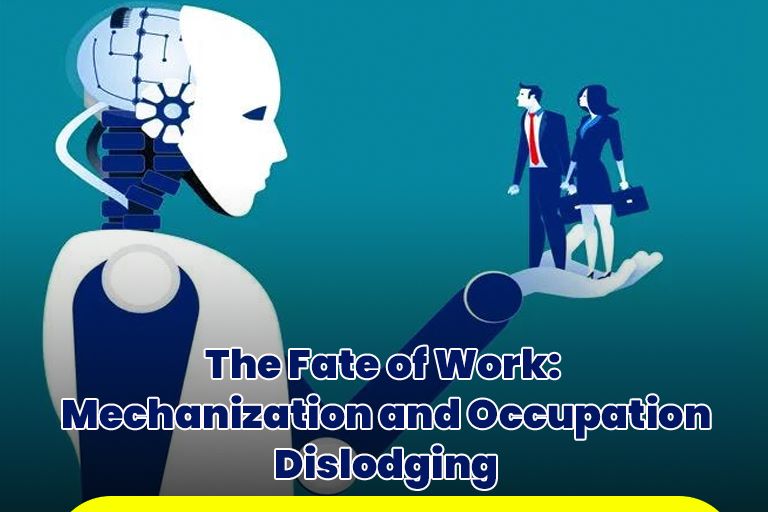The fast headway of innovation and mechanization has essentially changed the worldwide work market. From man-made brainpower (simulated intelligence) and mechanical technology to AI and large information, arising innovations are reshaping enterprises, prompting a significant effect on work designs. While computerization brings various advantages and opens doors, there is a developing worry about the likely relocation of human laborers. In this article, we will investigate the eventual fate of work, the ascent of robotization, and its suggestions for work removal.
- Automation Transformation:
Mechanization, driven by mechanical advancement, is changing enterprises no matter how you look at it. Assignments that were once performed solely by people are presently being mechanized using machines, calculations, and simulated intelligence frameworks. From assembling and transportation to client support and information examination, robotization is smoothing out processes, improving efficiency, and lessening costs.
- The Advantages of Computerization:
Computerization offers a few benefits for organizations and society overall. It expands productivity, exactness, and speed of activities, empowering associations to convey items and administrations more. Robotized frameworks can deal with redundant and everyday undertakings, opening up human specialists to zero in on additional complicated and imaginative undertakings. Also, computerization can further develop the working environment’s well-being, as unsafe undertakings can be appointed to machines.
- Job Removal Concerns:
Notwithstanding, the ascent of mechanization has raised worries about work dislodging. As machines become more skilled and practical, certain positions might become outdated or go through huge changes. Normal and unsurprising undertakings, for example, information section, sequential construction system work, and client assistance, are especially defenseless against mechanization. This relocation can prompt monetary vulnerability and social disturbance, as impacted specialists battle to adjust and track down new work potential open doors.
- Skill Movements and Reskilling:
While mechanization might dispense with certain positions, it additionally sets out new open doors. The eventual fate of work will expect people to gain and foster new abilities that supplement and team up with robotized frameworks. This shift requires an emphasis on reskilling and up skilling the labor force to guarantee they stay important in a changing position market. Deep-rooted learning, persistent preparation programs, and nimble schooling systems will be fundamental to furnishing people with the abilities required for the positions representing things to come.
- Embracing New Jobs and Ventures:
Computerization isn’t exclusively about work uprooting; it likewise prepares for the development of new jobs and enterprises. As innovation progresses, novel callings will emerge, like man-made intelligence coaches, information researchers, network safety specialists, and augmented reality architects. These occupations require a profound comprehension of arising innovations and specific abilities. Adjusting to these new open doors will require adaptability and a proactive way to deal with learning and professional improvement.
- Collaboration among People and Machines:
The fate of work is probably going to include closely coordinated effort among people and machines. While robotization can deal with dull and information-driven undertakings, human specialists bring novel characteristics like inventiveness, the ability to understand individuals on a profound level, and decisive reasoning. Associations that influence the qualities of the two people and machines will flourish in the advancing scene. This coordinated effort will cultivate advancement, critical thinking, and the improvement of novel thoughts.
- Economic and Social Effects:
Work dislodging because of mechanization can have extensive monetary and social results. For the time being, impacted specialists might confront monetary difficulties and joblessness, prompting pay imbalance and social turmoil. States, policymakers, and organizations should expect and address these difficulties through measures, for example, social well-being nets, pay support projects, and retraining drives to relieve the adverse consequences of occupation dislodging.
- Job Change and Crossover Jobs:
As opposed to getting done with task disposal, robotization frequently prompts the change of existing jobs. While certain errands might be robotized, new obligations and assignments that require human abilities arise. This change brings about cross-breed jobs, where people consolidate specialized mastery with mental capacities, versatility, and relational abilities. For instance, information investigators might have to decipher and impart the bits of knowledge produced by artificial intelligence frameworks.
- Entrepreneurship and Gig Economy:
The ascent of mechanization has likewise given impulse to business and the gig economy. As conventional business structures develop, people are progressively going to independent work, autonomous contracting, and beginning their organizations. The gig economy offers adaptability, and independence, and opens doors for people to use their one-of-a-kind abilities in a quickly evolving commercial center. Nonetheless, it additionally presents difficulties concerning professional stability, advantages, and laborer assurance that should be tended to.
- Ethical Contemplations:
As robotization turns out to be more predominant, moral contemplations become essential. Dynamic calculations and simulated intelligence frameworks ought to be created with straightforwardness, decency, and responsibility at the top of the priority list. Guaranteeing that mechanized frameworks don’t propagate inclinations or victimize specific people or gatherings is of vital significance. Moral rules and administrative systems should be laid out to administer the plan, arrangement, and utilization of computerized advances in the work environment.
- The Human Touch:
While robotization offers various advantages, it is fundamental to perceive and value the worth of human association. Certain businesses, like medical care, instruction, and friendliness, depend vigorously on human association and compassion. These areas will keep on focusing on human touch and customized encounters, even as mechanization invades different regions. Human laborers can offer close-to-home help, sympathy, and understanding that can’t be recreated by machines, making an agreeable harmony among innovation and human-driven administrations.
- Global Effect and Transformation:
The effect of robotization and occupation dislodging shifts across areas and areas. Non-industrial nations might confront special moves in adjusting to robotization due to varying degrees of framework, schooling systems, and admittance to innovation. It is fundamental to consider the worldwide ramifications of computerization and carry out comprehensive systems that guarantee nobody is abandoned. Worldwide cooperation, information sharing, and backing for changing economies will assume a vital part in dealing with the eventual fate of work on a worldwide scale.
Conclusion:
The fate of work is without a doubt being formed via mechanization and arising innovations. While there are genuine worries about work relocation, embracing the valuable open doors introduced via mechanization, reskilling the labor force, and cultivating cooperation among people and machines can prompt a prosperous and manageable future. By tending to the monetary, social, and moral difficulties related to computerization, we can make a future where innovation and human specialists coincide, driving development, efficiency, and human prosperity.
Read More:- The Fate of Work: Mechanization and Occupation Dislodging
Read More:- The Ascent of Blockchain: Changing Enterprises Past Digital Currency




